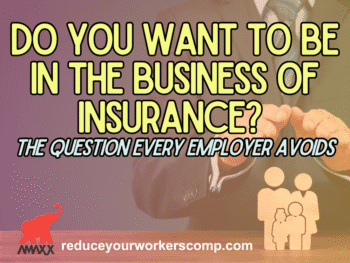Most employers understand workers’ compensation coverage, but if you ask them about their employers’ liability coverage, either you will get a blank look or they confuse employers’ liability coverage with their general liability insurance policy.
Employers’ liability could be considered the step-sister to workers’ compensation coverage. Employers’ liability insurance coverage, referred to as “stop gap coverage” in some jurisdictions, is designed to protect the employer from the injury, disease or death claims made by employees caused by workplace practices or conditions that are not covered by workers’ compensation.
While most employers initial reaction is to think all claims for injuries, disease or death are covered by workers’ compensation, there are exceptions. Workers’ compensation is often portrayed as an exclusive remedy for all work related injuries. However, plaintiff attorneys will look for ways around the workers’ compensation statutes as they strive for a bigger payday. The more common exceptions to workers’ compensation coverage found by these plaintiff attorneys would include:
Click Link to Access Free PDF Download
“The 5Cs to Taking a Bulletproof Injured Worker Recorded Statement”
- Intentional acts/torts by the employer.
[Example – the coal mine operator who knows there is excessive methane gas in the coal mine, but send the workers in anyway.]
- Third party cross claims.
[Example – the employee falls off a ladder, but instead of filing a work comp claim, files a lawsuit against the ladder manufacturer. The ladder manufacturer then files a third party cross claim against the employer for failure to properly maintain the ladder.]
- Dual capacity claims.
[Example – your company manufactures farm machinery, the employee is driving the new combine off the assembly line, the seat falls off, the employee lands hard on the floor and files a products liability claim against your company.]
- Diseases or injuries excluded by the state workers compensation statutes.
[Example – the employee develops arthritis from the repetitive aspects of her job. Your jurisdiction does not recognize arthritis as a work comp injury.]
- Consortium and other loss of services to family members.
General liability insurance companies wanting to remain profitable have excluded these same exceptions from their coverage as they do not want to cover work-related injury claims. The smart employer wishing to stay out of trouble will purchase employers’ liability insurance to cover the gap in coverage between workers’ compensation policy and the general liability policy.
The Workers’ compensation insurance company knowing that these exceptions to work comp coverage are not routine or every day claims, will add employers’ liability insurance coverage as a separate section (part 2) to their policy for an additional premium. Employers’ liability insurance and workers’ compensation insurance combined together provide the employer with greater overall coverage and eliminates more financial risk exposure.
Employers’ liability coverage is compulsory in some jurisdictions but elective in other jurisdictions. Where the coverage is elective it is still is normally combined with the workers’ compensation policy. Even if it is offered as a separate policy, it is recommended that it be purchased as the premium is relatively small but the potential for loss can be large. In the jurisdictions where employers’ liability insurance is compulsory, the employer who fails to have the coverage can be subject to fine or even face the force closure of the business—just like what happens when there is a failure to have workers’ compensation coverage.
In the four monopolistic states of North Dakota, Ohio, Washington and Wyoming, it is recommended for employers to purchase employers’ liability insurance to protect their company from the gap in coverage between the state fund and their general liability insurance. This is can be accomplished by buying the two part workers’ compensation and employers’ liability policy. (Don’t worry, the workers’ compensation insurance company knows it will not be paying any work comp claims in the monopolistic state and will adjust the premium accordingly. It comes with an endorsement that states Part 1 – Workers’ compensation will not apply in the monopolistic states).
Unlike workers’ compensation which will pay the employee’s benefits regardless how high the benefits may be in the catastrophic case, employers’ liability insurance is normally written with a maximum amount—a policy limit—on the amount it will pay per accident, per disease or bodily injury by disease. Like other forms of liability coverage, the policy limit is determined by the insured at the time of purchase, with higher limits carrying a higher insurance premium.
Even though employers’ liability insurance is meant to cover the gap between workers’ compensation insurance and general liability insurance, it also has exceptions to the coverage it provides. The employers’ liability policy will not provide coverage in a state where the employer’s work comp policy is not in force and it normally specifically excludes the crew of aircraft. Also, employers’ liability insurance is not discrimination insurance. It will not pay for employee claims for age discrimination, racial discrimination, sexual orientation discrimination, sex discrimination or wrongful discharge.
While employers’ liability claims are rare, the employer needs to understand the nature of the employers’ liability insurance to fully protect their company. If your workers’ compensation insurance company does not automatically attach it to your workers’ compensation policy, it is recommended you request it.
Author Rebecca Shafer, J.D. President of Amaxx Risk Solutions, Inc. has worked successfully for 20 years with many industries to reduce Workers’ Compensation costs, including airlines, healthcare, manufacturing, printing/publishing, pharmaceuticals, retail, hospitality and manufacturing. She can be contacted at: RShafer@ReduceYourWorkersComp.com or 860-553-6604.
WC Calculator: http://www.reduceyourworkerscomp.com/calculator.php
Do not use this information without independent verification. All state laws vary. You should consult with your insurance broker or agent about workers’ comp issues.
© 2010 Amaxx Risk Solutions, Inc. All rights reserved under International Copyright Law. If you would like permission to reprint this material, contact Info@ ReduceYourWorkersComp.com.
























When does an employer have to responsibly carry comprehensive coverage for any of the employees and their personal vehicles while on the job driving his materials from site to site? Surely the law covers this and demands employers to carry insurance in case of property damage or accidents.